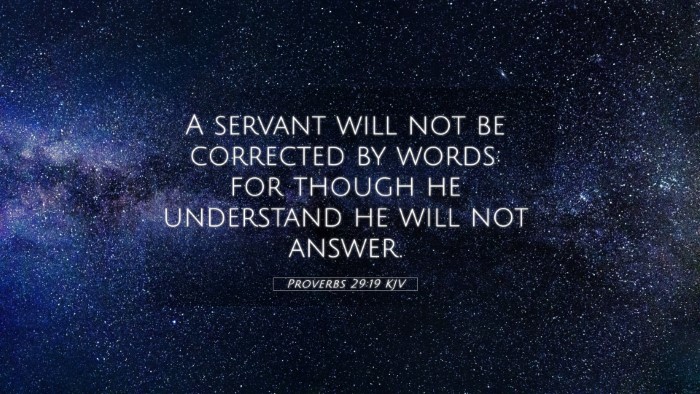Understanding Proverbs 29:19
Bible Verse: Proverbs 29:19 - "A servant will not be corrected by words: for though he understand he will not answer."
Verse Meaning Overview
Proverbs 29:19 presents a profound observation about the behavior of a servant who is confronted with discipline or correction. The verse suggests that mere words may not suffice to effect change in a disorderly servant, as understanding of instruction does not guarantee compliance or response. This speaks to the broader theme of human behavior in relation to authority and guidance.
Commentary Insights
-
Matthew Henry:
Henry suggests that this verse highlights the limitations of verbal correction. He points out that while servants may hear words of correction, true understanding and change come from deeper forms of discipline. Words alone may lead to mere acknowledgment without genuine transformation.
-
Albert Barnes:
Barnes emphasizes the importance of the heart in receiving correction. He aligns the idea that a servant’s unwillingness to respond indicates a hardened heart or lack of genuine understanding. The implication here is that effective correction must engage more than just the intellect; it must reach the will to change.
-
Adam Clarke:
Clarke underscores the nature of servitude in biblical times. He contends that servants, when guided by mere verbal correction, may not transform their behavior unless they also perceive a genuine incentive to change. Clarke's commentary suggests that more than just words are needed; the motivation behind servitude affects its response to correction.
Thematic Connections
This verse connects with several other biblical themes, emphasizing the necessity of effective obedience and the nature of instruction. Here are some cross-references that relate to Proverbs 29:19:
- Proverbs 12:1: "Whoever loves discipline loves knowledge, but whoever hates correction is stupid."
- Proverbs 15:5: "The fool spurns his father’s discipline, but whoever heeds correction shows prudence."
- Hebrews 12:11: "No discipline seems pleasant at the time, but painful. Later on, however, it produces a harvest of righteousness and peace for those who have been trained by it."
- Proverbs 19:27: "Stop listening to instruction, my son, and you will stray from the words of knowledge."
- Matthew 7:26: "But everyone who hears these words of mine and does not put them into practice is like a foolish man who built his house on sand."
- James 1:22: "Do not merely listen to the word, and so deceive yourselves. Do what it says."
- Colossians 3:22: "Slaves, obey your earthly masters in everything; and do it, not only when their eye is on you and to win their favor, but with sincerity of heart and reverence for the Lord."
Exploring the Connections
The connections between Bible verses can illuminate a deeper understanding of how themes of authority, correction, and obedience operate within the biblical text. Understanding Proverbs 29:19 can be enhanced by examining these connections:
- Engagement in active listening is crucial as highlighted in James 1:22, which stresses the importance of not just hearing but acting upon the guidance received.
- Hebrews 12:11 complements this sentiment by suggesting that the long-term benefits of correction far outweigh the temporary discomfort it may cause.
- The thematic undercurrents of obedience to authority are prevalent throughout the referenced verses, linking them through common principles of respect and adherence to correction.
Tools for Bible Cross-Referencing
Cross-referencing can significantly enhance one's understanding of biblical themes and how they interconnect. Here are some tools and methods for effective Bible cross-referencing:
- Bible Concordance: Utilizing a concordance allows for rapid identification of verses related by keywords.
- Bible Cross-Reference Guide: Many study Bibles include cross-reference systems to aid in understanding thematic relationships.
- Cross-Reference Bible Study: This method encourages readers to actively search for linked verses to see the broader narrative context.
Conclusion
Proverbs 29:19 serves as a vital reference point for understanding the nature of correction and the responses expected from those in a servile position. The insights gathered from public domain commentaries provide a well-rounded view that emphasizes the importance of engagement, motivation, and the spiritual implications of obedience. Engaging with related verses can enhance one's spiritual journey, providing a comprehensive understanding of Biblical themes of authority and correction.





